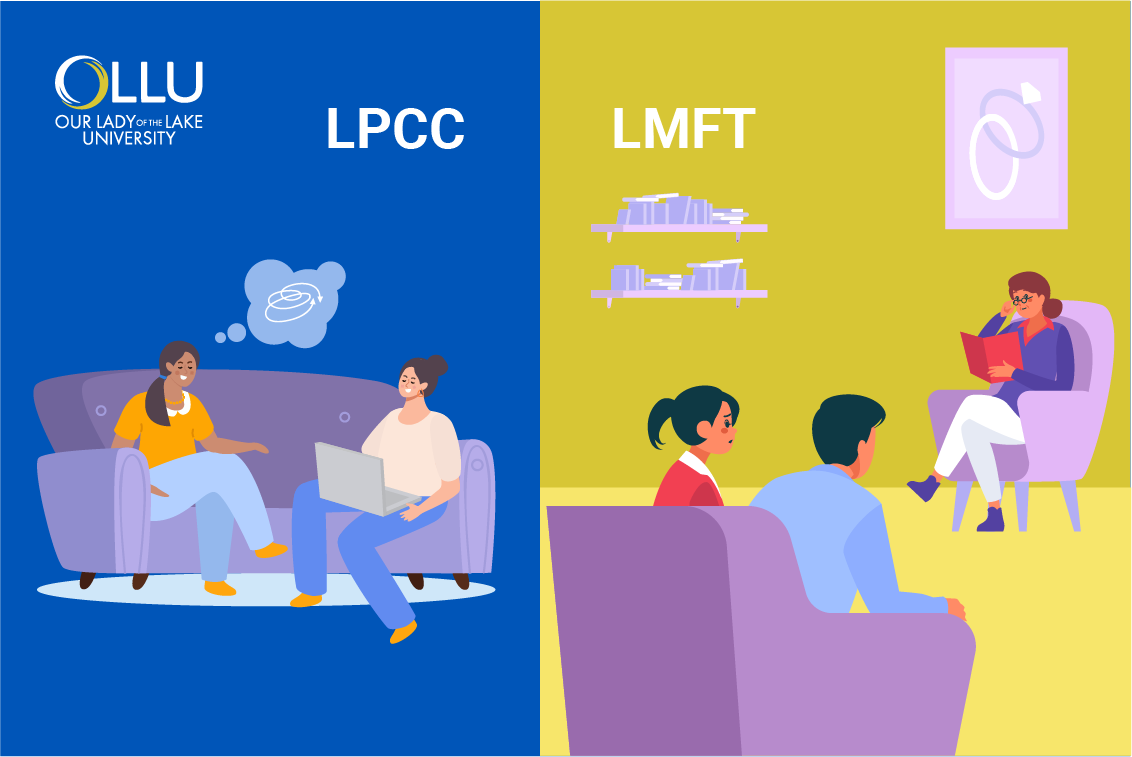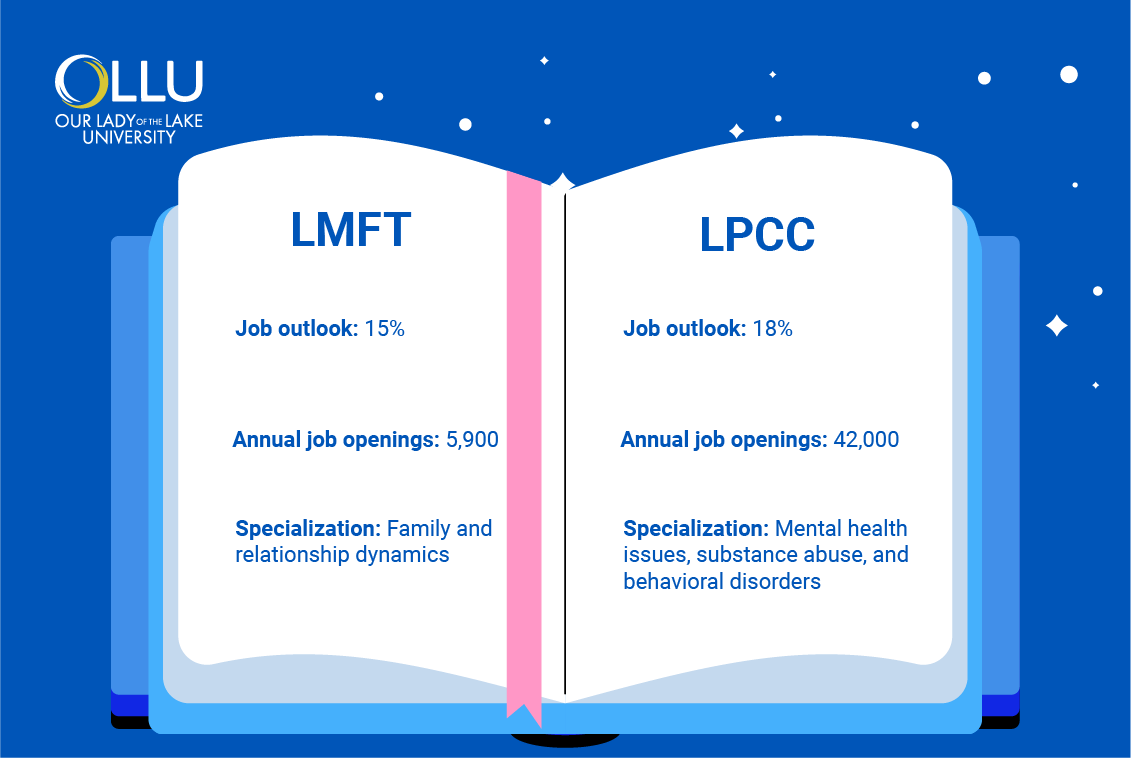LPCC vs. LMFT: What's the Difference?
Nov 22, 2023

In the realm of mental health and emotional well-being, two professional designations frequently appear: Licensed Professional Clinical Counselor (LPCC) and Licensed Marriage and Family Therapist (LMFT). These two roles are vital components of the mental health field, each with its distinct focus and expertise.
In this article, we will explore the differences between LPCC vs. LMFT, including their unique roles, training, and areas of specialization.
Understanding the Basics
To better understand LPCC vs. LMFT, it is important to know the definitions and scope of each profession.
LMFT Meaning
Licensed Marriage and Family Therapists (LMFTs) are professionals with expertise in marriage and family therapy. Within this specialized field, they address a diverse range of subjects. Some key areas of focus for LMFTs include:
- Childhood counseling
- Relationship counseling
- Premarital counseling
- Separation counseling
- Divorce counseling
LPCC Meaning
Licensed professional clinical counselors (LPCC) primarily concentrate on addressing the mental health needs of individuals to enhance their well-being. While they can also engage in group and family settings, LPCCs have a wide-ranging scope of practice that encompasses the diagnosis and treatment of individuals facing a spectrum of challenges, including but not limited to:
- Mental and emotional disorders
- Substance abuse issues
- Disabilities
- Personal trauma
- Psychological and social developmental disorders
Education Differences
Although LPCCs and LMFTs require master's degrees, their educational prerequisites are similar.
LMFT
Becoming an LMFT involves several steps beyond obtaining your undergraduate degree. If you aspire to build a career as a therapist, particularly as an LMFT, the following are the standard procedures to pursue:
- A bachelor’s degree, which need not be specifically in psychology.
- A master’s degree from a program accredited by the Commission on Accreditation for Marriage and Family Therapy Education (COAMFTE).
- Accumulate clinical experience by completing approximately 3,000 supervised hours under the guidance of a clinical psychotherapist.
- Successfully pass both state and nationally recognized licensure or certification examinations.
LPCC
Much like LMFTs, LPCCs need to fulfill the following requirements to attain their licenses and become certified therapists:
- Complete a bachelor’s degree, which doesn’t have to be in psychology.
- Pursue a master’s in counseling or a closely related field.
- Accumulate clinical experience through approximately 3,000 supervised hours under the guidance of a licensed psychotherapist.
- Successfully pass both state and nationally recognized licensure or certification examinations.
Licensing and Regulations
Licensing is mandatory for both LMFTs and LPCCs. Here's how to obtain it.
LMFT
To become a licensed marriage and family therapist, you must have a master’s degree and complete a period of supervised clinical experience, commonly known as an internship, practicum, or residency. You must also pass a state-approved exam and participate in ongoing education courses.
For further information on licensure for MFTs, you can refer to the Association of Marital and Family Therapy Regulatory Boards.
LPCC
LPCC licensing requirements vary by state, but all states require a master’s degree and completion of a specified number of hours of supervised clinical experience. They must also pass an examination and complete continuing education every year.
Career Opportunities
While LMFT and LPCC both involve helping people with mental health issues, there are some differences between their career opportunities.
LMFT
LMFTs can expect a significant increase in job opportunities in the coming years due to the increasing need for mental health services in the United States. They have diverse options when it comes to where they can work, including:
- Hospitals
- Educational institutions (schools)
- Private practice
- Government agencies
- Outpatient centers
- Rehabilitation facilities
- Nonprofit organizations
LPCC
The demand for mental health support is expected to continue rising, with a projected increase in LPCC employment . Their wide range of career opportunities includes the following:
- Private practice counselor
- School or college counselor
- Crisis intervention counselor
- Military counselor
- Rehabilitation counselor
- Grief counselor
- Mental health counselor
Skills and Traits for Success
Licensed marriage and family therapists and licensed clinical professional counselors are two professions that share a significant number of skills and traits vital for their success in helping their clients.
LMFT
LMFTs require several skills to provide effective therapy and support to their clients. These skills include:
- Compassion: LMFTs deal with clients facing challenging and stressful circumstances. Therefore, they must have the ability to show empathy and understanding towards their clients.
- Interpersonal skills: LMFTs have direct interactions with clients and other professionals, so they must be skilled at fostering positive relationships.
- Listening proficiency: To understand clients' issues, values, and objectives, LMFTs must wholeheartedly focus on their clients.
- Organizational skills: LMFTs working in private practice must manage financial transactions and collaborate with insurance companies.
- Effective communication skills: LMFTs must be able to convey information in a clear and understandable manner to their clients.
LPCC
LPCCs need to possess certain important skills to be effective in their role. These include:
- Communication skills: LPCCs need to convey ideas and information to clients proficiently and create concise yet comprehensive reports documenting clients' progress.
- Compassion: LPCCs assist individuals grappling with challenging and stressful situations, requiring them to exhibit empathy and understanding towards their clients.
- Interpersonal abilities: LPCCs must be able to establish and nurture positive relationships with people from diverse backgrounds.
- Listening skills: LPCCs need to provide their clients with undivided attention to comprehend each client's unique issues and values.
- Patience: LPCCs must remain composed when dealing with clients of all dispositions, including those who may be distressed or angry.
Financial Considerations
The financial rewards of both professions can be quite substantial, making them attractive career choices for many people.
The average salary for LMFTs is $83,206 per year, while LPCCs earn $76,890 annually. The income range for both professions varies, with the top earners in the LPCC category ($114,000) making more than those in the LMFT category ($110,000). These wage differences reflect the variations in roles, responsibilities, and specializations between the two professions.
Future Outlook

According to the Bureau of Labor Statistics (BLS) data, LMFT and LPCC professions are experiencing substantial employment growth. LPCCs expect a slightly higher growth rate and significantly more job openings due to their broader scope of practice.
LMFT
Licensed marriage and family therapists specialize in family and relationship dynamics, often providing therapeutic services to couples and families. These professionals anticipate a 15% growth by 2032 , with approximately 5,900 job openings expected over the decade. This growth rate is faster than the average across all occupations.
LPCC
Meanwhile, the LPCC profession projects an 18% employment growth by 2032 , with about 42,000 job openings expected over the decade. The growth rate for LPCCs is much faster than the average for all occupations.
Licensed professional clinical counselors specialize in addressing individual mental health issues, substance abuse, and behavioral disorders, contributing to their higher projected growth and increased job opportunities in the field.
Which one should I choose?
The choice between becoming an LPCC (Licensed Professional Clinical Counselor) and an LMFT (Licensed Marriage and Family Therapist) depends on your interests, career goals, and who you wish to work with.
Choose LPCC if:
You want to provide counseling for mental health issues for various clients and settings, focusing on individual diagnosis and treatment.
Choose LMFT if:
You are passionate about working with couples, families, and individuals and helping them navigate issues within the context of their relationships.
Bottom Line
Both LPCCs and LMFTs play critical roles in enhancing the mental and emotional well-being of individuals and families, offering support tailored to their unique circumstances.
The comparison between LPCCs and LMFTs highlights the essential distinctions between these two roles in the field of mental health and therapy. By understanding these differences, individuals seeking therapy can make more informed decisions, ensuring they receive the specialized care that aligns with their needs.
Check out OLLU's Master of Science degree in Psychology with a concentration in Marriage and Family Therapy , as it meets the academic requirements for licensure as an LMFT and licensure as a Professional Counselor (LPC).
Furthermore, you can also check our Online Master of Arts in Counseling (MAC) , which was ranked one of the top 10 best online master's in School Counseling programs for 2023 by Forbes.
Frequently Asked Questions (FAQs)
What does LPCC stand for?
LPCC stands for Licensed Professional Clinical Counselors, master's specialists trained to help people improve their mental health.
What does LMFT stand for in psychology?
LMFT stands for Licensed Marriage and Family Therapist. These professionals focus specifically on the relational and interpersonal dynamics within families and marriages.
What's the difference between a counselor and a therapist?
Counselors tend to work with life challenges in a shorter time frame, whereas therapists provide ongoing treatment for mental health issues.
What are the educational requirements for becoming an LPCC and an LMFT?
For LMFTs, candidates must have a master’s in a related field, including a master’s in marriage and family therapy or a psychotherapeutic-related master’s degree. LPCs are required to have a graduate degree in mental health counseling.
Where do LPCCs and LMFTs work, and what types of clients do they typically see?
LPCCs assess and treat individuals with emotional, behavioral, or addiction issues. They work in private practice, nonprofits, VA, hospitals, or prisons.
On the other hand, LMFTs specialize in the dynamics of families, marriages, and couples in interpersonal relationships. They can work in hospitals, schools, private practice, government agencies, outpatient centers, rehabilitation centers, and nonprofit organizations.